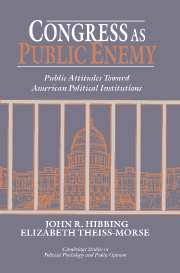Book contents
- Frontmatter
- Contents
- List of figures
- List of tables
- Preface
- CONGRESS AS PUBLIC ENEMY
- 1 Introduction: What is wrong with the American political system?
- 2 Changing levels of support for individual institutions
- 3 Perceptions of political institutions
- 4 Perceptions of congressional features and reforms
- 5 Focus groups and perceptions of the Washington system
- 6 Who approves of Congress?
- 7 Support for democratic processes
- 8 Conclusion: The people and their political system
- Appendix
- References
- Index
8 - Conclusion: The people and their political system
Published online by Cambridge University Press: 05 August 2012
- Frontmatter
- Contents
- List of figures
- List of tables
- Preface
- CONGRESS AS PUBLIC ENEMY
- 1 Introduction: What is wrong with the American political system?
- 2 Changing levels of support for individual institutions
- 3 Perceptions of political institutions
- 4 Perceptions of congressional features and reforms
- 5 Focus groups and perceptions of the Washington system
- 6 Who approves of Congress?
- 7 Support for democratic processes
- 8 Conclusion: The people and their political system
- Appendix
- References
- Index
Summary
We see a need for reorienting the way political observers consider and conceptualize public opinion and political institutions. Researchers have traditionally treated public opinion and governmental institutions as distinct entities. What little overlap they concede usually places institutions in a peripheral or marginalized category by focusing either on vote choice, which shapes the membership of the institutions, or on the congruence of views between constituents and governmental officials within a narrow policy area. Yet the relationship between citizens and their governmental institutions is much more than this scholarship allows. The relationship, properly conceived, includes how people feel about their institutions, what they like and dislike, proposed changes they support and oppose, and the way the institutions interact with people like them. The research reported in this book constitutes an attempt at analyzing this larger relationship between public opinion and governmental institutions. What have we found?
IT'S THE PROCESS, STUPID
Discussions of public opinion have usually pertained to voting behavior, and thus have detailed the public's evaluations of specific candidates in terms of policy concerns, partisanship, and perceptions of candidate image. When the dependent variable is evaluation of a branch of government rather than of an individual, however, another variable must be added to the mix. This variable is process, and it has been at the heart of our presentation. People's views of the political system and of particular bodies within that system are shaped not just by policy outcomes, by the image of certain individuals, or by partisan loyalties, but primarily by the processes employed in the system and in the institutions.
- Type
- Chapter
- Information
- Congress as Public EnemyPublic Attitudes toward American Political Institutions, pp. 145 - 162Publisher: Cambridge University PressPrint publication year: 1995



